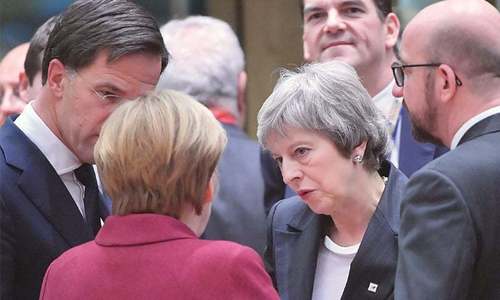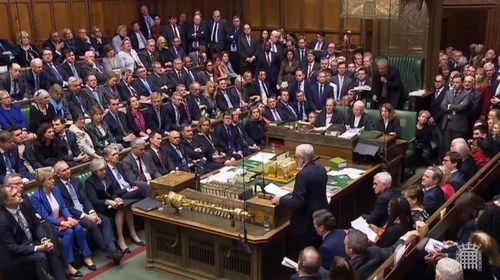In a stalemate over Brexit, British politicians have chosen to delay it.
After weeks of political gridlock, British Parliament voted on Thursday to seek to postpone the country's departure from the European Union, a move that will likely avert a chaotic withdrawal on the scheduled exit date of March 29.
With Brexit due in 15 days and no divorce deal yet approved, the House of Commons voted 413-202 to ask the bloc to put off Britain's exit until at least June 30. The official result was initially announced as 412-202, but was later amended to 413 in the official voting list.
The vote gives Prime Minister Theresa May some breathing space, but is still humbling for a leader who has spent two years telling Britons they were leaving the bloc on March 29.
Power to approve or reject the extension lies with the EU, which has signalled that it will only allow a delay if Britain either approves a divorce deal or makes a fundamental shift in its approach to Brexit. In a historic irony, almost three years after Britain voted to leave the EU, its future is now in the bloc's hands.
May is likely to ask EU leaders for an extension at a March 21-22 summit of the bloc in Brussels.
The European Commission said the bloc would consider any request, "taking into account the reasons for and duration of a possible extension".
May was forced to consider a Brexit delay after lawmakers twice rejected her EU divorce deal and also ruled out, in principle, leaving the bloc without an agreement. Withdrawing without a deal could mean major disruptions for businesses and people in the United Kingdom and the 27 remaining countries.
By law, Britain will leave the EU on March 29, with or without a deal, unless it cancels Brexit or secures a delay.
Thursday could have been worse for May. Lawmakers rejected an attempt to strip her of control over the Brexit agenda. They defeated by the narrowest of margins 314-312 an opposition attempt let Parliament choose an alternative to May's rejected divorce deal and force the government to negotiate it with the EU.
Lawmakers also voted against holding a second Brexit referendum at least for now.
By a decisive 334-85 vote, they defeated a motion that called for another vote by the public on whether to stay in the EU or leave. Campaigners for a new referendum are divided over whether the time is right to push for a second Brexit vote. The vote doesn't prevent lawmakers from trying again later to get Parliament's support for another referendum.
Despite the rebuffs and the political chaos that have weakened her authority, May has signalled she will try a third time to get backing for her agreement next week. She is seeking to win over Brexit-backing opponents in her own party and its Northern Irish political ally, the Democratic Unionist Party, who fear the deal keeps Britain too closely tied to the EU.
Alan Wager, a researcher at the UK in a Changing Europe think tank, said May faced a struggle to overturn a 149-vote margin of defeat in Parliament this week.
“It's still really difficult to see how the numbers stack up for Theresa May, but she's giving it one more go,” he said.
If May's deal is approved, she hopes to use a delay until June 30 to enact legislation needed for Britain's departure. She has warned Brexit supporters who oppose her deal that if no withdrawal agreement is passed in the coming days, the only option will be to seek a long extension that could mean Brexit never happens.
Any delay in the Brexit process would require the unanimous approval of all 27 remaining EU member states and leaders in the bloc are exasperated at the events in London. They have said they will approve an extension if there is a specific reason, but don't want to provide more time for political bickering in Britain.
“Under no circumstances an extension in the dark!” tweeted the European Parliament's Brexit coordinator, Guy Verhofstadt. “Unless there is a clear majority in the House of Commons for something precise, there is no reason at all for the European Council to agree on a prolongation.”
Belgian Prime Minister Charles Michel said the EU needed “more decisions” from London.
The EU is also reluctant to postpone Brexit beyond the late May elections for the European Parliament, because that would mean Britain taking part even as it prepares to leave.
The bloc is more open to a long delay to allow Britain to radically change course an idea favoured by pro-EU British lawmakers who want to maintain close ties with the EU.
European Council President Donald Tusk tweeted that he will appeal to EU leaders “to be open to a long extension if the UK finds it necessary to rethink its Brexit strategy and build consensus about it.”
Trump says Brexit negotiations were 'badly' handled
In another sting for May, United States President Donald Trump said he was “surprised at how badly” the Brexit negotiations have been handled. Trump, who sees himself as a deal-maker, said he gave May advice but she didn't listen to him.
Speaking alongside Irish Prime Minister Leo Varadkar at the White House, Trump said Britain's debate over leaving the EU was “tearing the country apart".
British businesses expressed relief at the prospect of a delay. Many worry that a no-deal Brexit would cause upheaval, with customs checks causing gridlock at UK ports, new tariffs triggering sudden price increases and red tape for everyone from truckers to tourists.
Josh Hardie, deputy director-general of the Confederation of British Industry, said the vote for an extension showed there was "still some common sense in Westminster".
"But without a radically new approach, business fears this is simply a stay of execution,” he said.















































